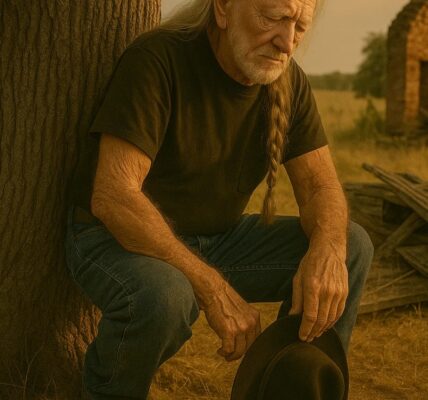Some musicians play guitars. Willie Nelson lives through one. For more than half a century, his battered Martin N-20 nylon-string guitar, affectionately named Trigger, has been more than an instrument — it has been a partner, a diary, and a living icon of American music. Every scratch, every hole, every worn string is not damage, but history. And every time Nelson lays his hands on it, Trigger speaks with a voice rawer, freer, and more honest than anything polished or pristine could ever achieve.

When Willie plays Trigger, he doesn’t just perform songs. He tells stories.
A Guitar Like No Other
Bought in 1969 after a house fire destroyed most of his belongings, Nelson chose the Martin N-20 not for its flash, but for its warmth and resonance. He named it after Roy Rogers’ horse, Trigger — the faithful companion who was always ready for the ride. That name became prophetic, because Willie and Trigger would never part ways again.
Unlike most country stars, Nelson didn’t swap guitars as they aged or wore down. He stayed loyal. Decades of constant touring, thousands of shows, millions of strums — all of it left visible marks. The large, gaping hole near the soundboard is as recognizable as Nelson’s voice. Where others might see damage, fans see character, the living soul of outlaw country carved into wood and nylon.
Trigger isn’t just a guitar. It’s Willie Nelson’s second heartbeat.
The Sound of Freedom
Willie Nelson has always been more than a country singer. He is a rebel, a poet, a storyteller who refused to be caged by Nashville’s rules. And Trigger became the weapon of that rebellion.

Listen closely and you’ll hear it: the free-flowing runs, the jazzy flourishes, the unexpected pauses. Nelson never plays the same song twice the same way. He lets the guitar breathe, wander, cry, and laugh with him. His playing is part jazz, part country, part blues — but mostly pure Willie.
With Trigger, Nelson doesn’t just hit notes. He bends time. His solos slip ahead of the beat, then fall behind, creating tension and release that feels alive. It’s not perfect, but that’s the point. It’s real. It’s human. It’s free.
A Guitar with Scars of a Nation
Every scar on Trigger carries a story — not just of Nelson, but of the nation itself. This guitar has been on the road through turbulent decades: the Vietnam War, Watergate, civil rights struggles, 9/11, political divisions, cultural revolutions. Willie played through them all, using Trigger to deliver comfort, rebellion, and raw honesty.
He performed for farm workers, prisoners, presidents, and outlaws alike. He stood up for marijuana legalization when it was taboo, for family farmers when they were forgotten, and for peace when war seemed endless. Each time, Trigger was there — battered but unbroken, just like its owner.

That hole in the wood? It’s not damage. It’s a monument. A reminder that great art isn’t flawless, it’s fearless.
Fans Treat It Like a Relic
When Trigger comes out on stage, crowds erupt as if a rock god had walked into the room. They don’t just cheer for Willie — they cheer for the guitar. Fans reach out, hoping for a glimpse, a photograph, a touch. Some describe seeing Trigger in person as a spiritual experience, as though they were witnessing a holy relic of American music.
And in a way, they are.
Trigger is enshrined in the mythology of outlaw country. It’s as iconic as Elvis’s jumpsuits, Johnny Cash’s black coat, or Bob Dylan’s harmonica. But unlike museum pieces, Trigger is still alive, still being played, still carrying the weight of Willie’s journey every night on stage.
Musicians in Awe
Ask any guitarist, and they’ll tell you: Willie’s playing on Trigger is unlike anyone else’s. His phrasing ignores the rules, yet lands exactly where it should. His tone is warm, imperfect, yet instantly recognizable. The guitar doesn’t just accompany him; it converses with him.
Legends from Eric Clapton to Keith Richards have expressed awe for Nelson’s bond with Trigger. Younger musicians study it, knowing they’ll never fully replicate the magic. Because the truth is, you can’t learn Willie Nelson. You can only feel him.
And you feel him most through Trigger.
More Than Music
What makes Trigger truly special is that it embodies more than songs. It embodies loyalty, perseverance, and authenticity. In a world where stars chase the latest gear, the newest sound, or the flashiest style, Willie Nelson stayed true. He chose one guitar, and he made it his world.
That loyalty mirrors his music. Nelson never conformed to Nashville’s cookie-cutter sound. He carved his own path — rough, honest, and unforgettable. Trigger became the symbol of that journey, carrying the same spirit of rebellion and resilience.
It reminds us that greatness isn’t about perfection. It’s about truth.
The Future of Trigger
Fans often wonder what will happen when the day finally comes that Willie Nelson can no longer play. Will Trigger retire to a museum? Will it be passed down?
Nelson himself has hinted that Trigger will go with him when he’s gone. That bond is too deep, too sacred, to be separated. It’s a love story between man and instrument that deserves to end together.
But whether Trigger ends up in a museum, a family home, or buried alongside Willie, its story is already immortal. Because the legend of Trigger isn’t just in the wood and strings — it’s in the millions of hearts it has touched.
The Living Legend
In the end, Willie Nelson’s Trigger is more than a guitar. It is a symbol of America’s soul: battered, scarred, imperfect, but still singing. It’s proof that art doesn’t have to be polished to be powerful. It doesn’t have to be new to be relevant. It just has to be real.
Every time Willie strikes those strings, Trigger tells us: music is about freedom, honesty, and spirit. And in a world of auto-tune and factory-made hits, that reminder is more vital than ever.
Willie Nelson is an icon. But Trigger is his shadow, his partner, his eternal flame. Together, they’ve created not just songs, but a legacy that will echo long after the final chord fades.
And maybe that’s the greatest lesson of all: true legends aren’t built by perfection. They’re built by scars, stories, and a relentless refusal to be silenced.




